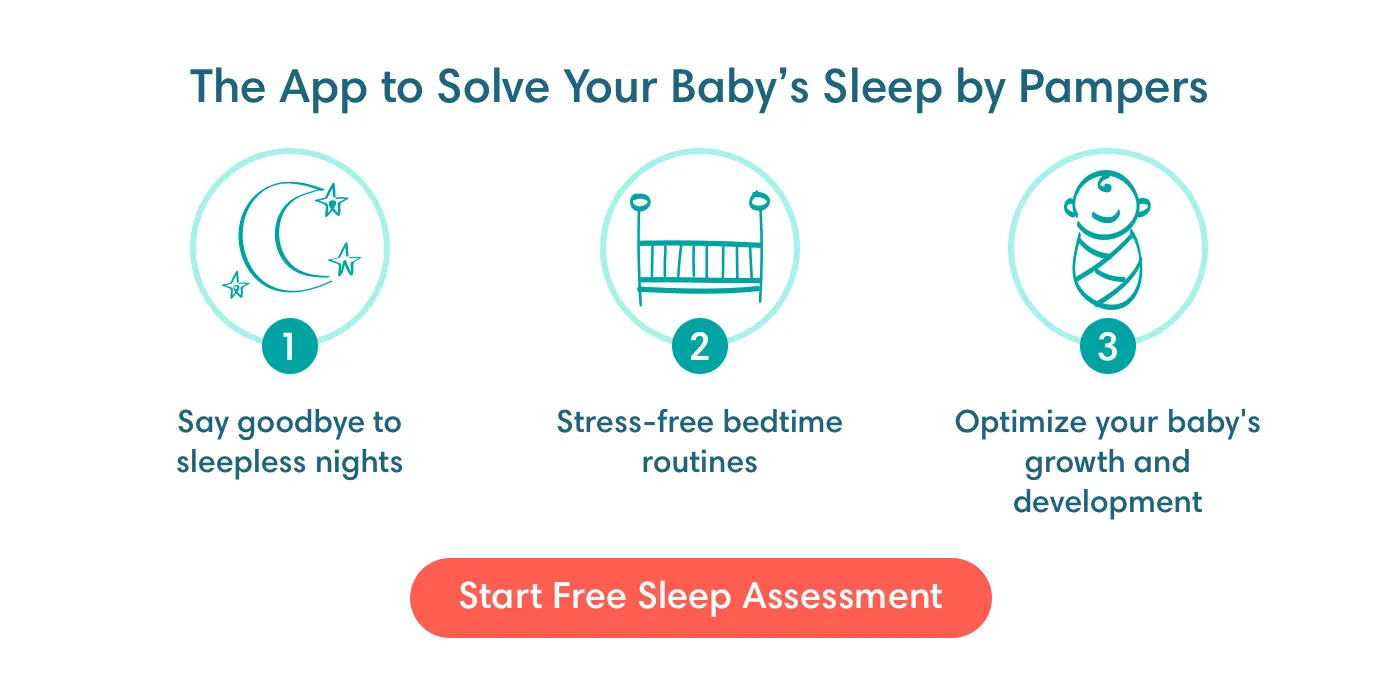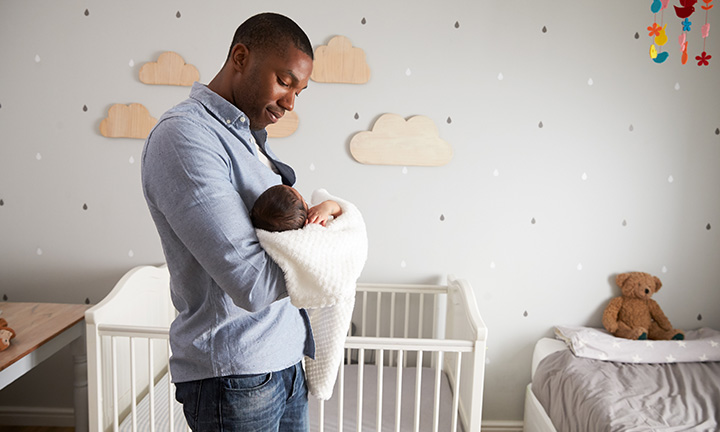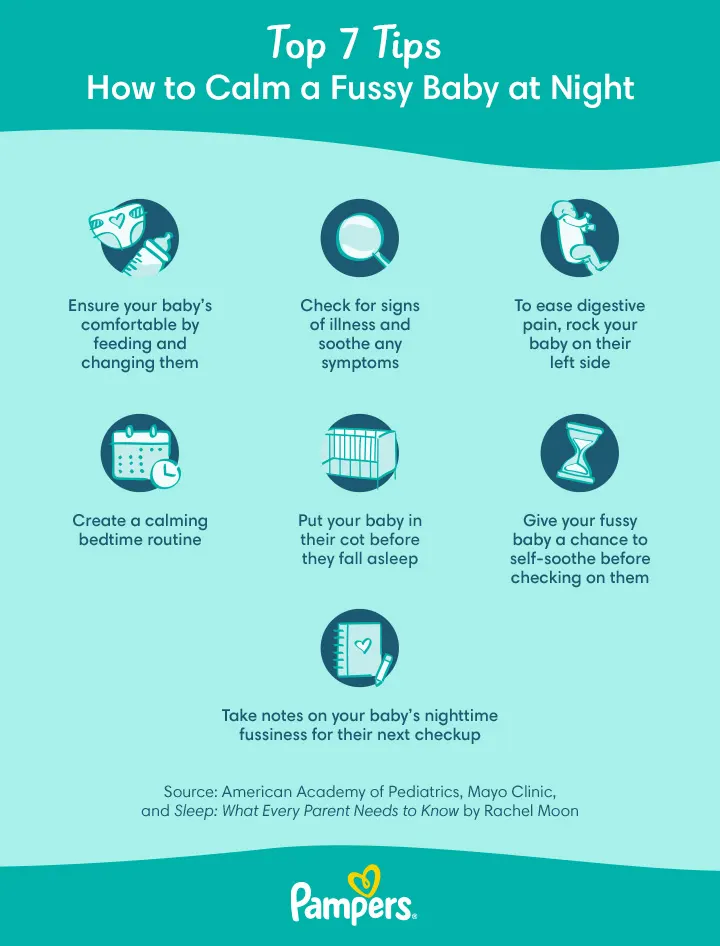
Fussy and Crying at Night: Ways to Calm Your Baby
Key Takeaways
When you’ve got a baby crying at night, it can feel like a real handful. Although ‘fussy’ may mean different things to different parents, when your baby is crying in the middle of the night and is difficult to console, you could say that they’re being fussy. Crying itself is the natural and expected way for babies to communicate a range of needs – but why does it happen at night (and sometimes for no clear reason)? Keep reading for answers to this very common parenting question.
What Is a Fussy Baby?
There’s no standard definition or single example of a ‘fussy baby’, because each child's temperament is unique. What you might think of as fussy is likely different from the way other parents may describe the behaviour. But, in the context of decoding your baby’s night-time cues, a fussy baby usually means a baby that cries and is hard to console. Because babies can’t yet use words, their crying, fussiness or irritability can be a way to express what's going on or inform you that they need something.
Why Do Babies Cry or Get Fussy at Night?
If you’re a sleep-deprived parent, rest assured that you’re not the only one asking yourself this question! Babies cry during the day and newborns are also fussy at night -it’s a fact – but that doesn’t make it any easier when your little one seems extra fussy and hard to console before bedtime.
The good news is that there’s almost always a reason babies cry and/or appear fussy, including at night.
Among the most common reasons babies become fussy at night or during the day are:
Fussy Baby at Night: Hunger, Nappy Changes and Temperature
When your baby is uncomfortable, it’s likely they’ll cry to let you know. Feeling hungry, having a wet or soiled nappy, or being too hot or too cold are all reasons your baby may cry and act a bit fussy at night.
Feedings and Nappy Changes
Although parenting is usually unpredictable, there are a couple of things you can count on: feedings and nappy changes! Your infant will probably sleep most of the time during a 24-hour period, but not necessarily for long stretches of time, as a newborn sleep schedule tends to coincide with feeding and changing.
As your baby grows older, they’ll wake less frequently. However, if you’re wondering when babies sleep through the night, that may not happen until about 8 or 9 months of age, or older. A fussy baby at night could very well be a hungry baby in need of feeding. Likewise, babies don’t typically enjoy the feeling of being wet or soiled, so don’t be surprised if your fussy baby needs a nappy change.
Check your baby’s fingers and toes. A surprisingly common reason for a fussy baby at night is a stray hair wound around a little finger or toe.
Temperature
To ensure safe sleep for babies, it’s important that your little one isn’t too hot or cold. Dress your baby in clothing meant for sleeping, and use no more than one additional layer than you would wear. And, check that the room temperature isn’t too hot or cold. It should feel cool, but comfortable to you, about 16 to 20° C. Be sure that the cot is placed away from windows to avoid direct sunlight and drafts, and also away from radiators. It might take some time to understand exactly what your baby needs, so check on your little one regularly, and adjust their clothing or room temperature as needed.
Signs that your little one is overheated include sweating, damp hair, flushed cheeks, or heat rash. Signs that your baby may be too cold and at risk of hypothermia include skin that’s cold to the touch, bright red skin, inactivity/lack of energy and a body temperature under 35° C (95° F).
Fussy Baby at Night: Illness and Digestion
If your baby or newborn is fussy at night, another reason could be digestive issues or some sort of illness. Remember that your little one is communicating to you in the only way they know how, so if they’re not feeling well, they’ll likely cry. If your baby is restless at night, but not necessarily crying, it could be a sign of abdominal pain or gassiness. For example, your baby may move around, drawing their legs up to relieve this pain. Other common ailments and conditions that can cause fussiness include:
Fussy Baby at Night: Feelings and Discomfort
Besides crying from physical discomforts, babies can also be fussy at night due to conditions or feelings that they don’t know to manage quite yet. Some common emotional reasons for a fussy infant are:
In these cases, your baby may just need your attention or a little soothing. But in some situations, your baby might be experiencing colic or separation anxiety, which we discuss below.
Colic
If your baby cries at the same time every night, and cries extensively without stopping, this pattern could indicate colic. Colic is when an otherwise healthy baby has inconsolable crying spells that typically
Colic can be confusing for parents because it can seem that your baby is crying at night for no reason. A baby with colic tends to be an extremely fussy baby or one that cries every night at the same time and is inconsolable. You typically have to wait it out, but if you ever have any questions or concerns about how to deal with colic, consult your baby’s doctor.
Separation Anxiety
Your newborn may be fussy at night and cry for a number of reasons, but separation anxiety wouldn't be a likely cause until your baby is a little older and can grasp the concept of object permanence. Once babies begin to understand this idea that something or someone can exist when it's not in sight, they often become anxious and cry when a parent leaves the room, not knowing when and if to expect their parent's return. Separation anxiety typically begins in the second half of the first year, often at around 8 or 9 months. If your baby only cries at night when you leave the room or is fussy all night because they seem to miss you, they could be experiencing this emotion. Whether it’s colic, separation anxiety or any of the common issues listed above, sleep is not easy for a baby!
The Best Ways to Calm a Fussy Baby at Night
Once you can identify the reason behind your baby’s fussiness, you'll be better equipped to respond. But knowing how to calm a fussy baby at night tends to be more about prevention rather than just reaction. If you look at your baby’s night-time fussiness by general groupings of symptoms (physical symptoms vs. emotional discomforts), there are a few tactics that can help you calm and maybe even prevent your child’s fussiness.
Calming a Fussy Baby at Night: Physical Symptoms
If your newborn or older baby is fussy at night and won’t sleep, it could be due to the physical symptoms listed above. Here are a few things you can do to try to avoid these sleep interrupters and soothe a fussy baby:
And as you help your little one remain calm at night, check out this video from Mandy, a Paediatric Sleep Coach, so you are set up for success:
Calming a Fussy Baby at Night: Emotional Symptoms
If you have a fussy baby at night because of an emotional symptom, your game plan will look a little different. It’s tempting to run and comfort your baby at the first whimper, but you’ll want to find a balance between comfort and helping your little one learn to self-soothe, such as with the Ferber Method sleep training technique.
Here are a few tips that may help:
When Will My Baby Stop Crying at Night?
Are you wondering when your baby will get less fussy – and hoping that time comes soon? Hang in there! As babies continue to mature and reach developmental milestones, they may also start to sleep better. Most babies will eventually fall into a natural sleep pattern. However, some babies are more sensitive than others and struggle adapting to a routine or settling down when feeling fussy. If this is the case with your little one, know that in time, your fussy baby may become calmer and stop crying as much. Consider a few of these timelines and milestones, which may indicate that your baby’s regular fussiness at night is about to become a thing of the past:
When to Contact Your Baby’s Doctor
Having a fussy baby at night is common and may occur for many reasons, most of them natural, expected and not a cause for concern. But, of course, when your baby is extremely fussy and crying uncontrollably or all night long, you may find it difficult to cope, and may need to reach out for help and advice. Don't hesitate to call on your child’s doctor. If your baby’s fussiness is a sign of a deeper issue, the doctor can help you get to the root of the problem. Or they can suggest other soothing techniques more specific to your situation.
FAQS AT A GLANCE
Being hungry, needing a nappy change or just simply feeling uncomfortable are all possible reasons your little one might be fussy. Because your newborn can’t tell you how they feel, they rely on crying to communicate. Keep an eye out for your baby suddenly crying inconsolably at night, as that could mean they’re experiencing colic.
The Bottom Line
Because every little one has a unique temperament, there’s no exact definition or meaning of a ‘fussy baby’. But, when we talk about fussiness, we’re generally referring to scenarios when babies keep crying to communicate that something’s wrong, which is a natural and expected behaviour. So, what’s behind a fussy baby at night? Your baby may be crying and acting fussy at night for any of these reasons:
The best strategies to calm a fussy baby at night involve anticipating your baby’s needs by feeding and changing their nappy before bed, creating a soothing and calming bedtime routine and comforting them (young infants) or helping them learn self-soothing techniques (older babies). Also, a little bit of patience can go a long way, and remember that babies will eventually outgrow things like colic and separation anxiety and begin sleeping for longer periods at night as their sleep cycle naturally adjusts. Hang in there! Soon enough, your baby will outgrow their night-time fussiness. But if you have any questions or concerns, your child’s doctor is always there to support you.
- NHS. Baby and Infant Safe Sleeping Guidance.
- NHS. Baby Teething Symptoms.
- NHS. Colic.
- NHS. Constipation.
- NHS. Cough/Colds in Children Under 1 Year of Age – Advice Sheet.
- NHS. Earache.
- NHS. Headache.
- NHS. Help Your Baby Learn to Talk.
- NHS. Help Your Child to Sleep.
- NHS. Helping Your Baby to Sleep.
- NHS. How to Take Your Baby’s Temperature.
- NHS. Hypothermia.
- NHS. Reduce the Risk of Sudden Infant Death Syndrome (SIDS).
- NHS. Separation Anxiety.
- NHS. Soothing a Crying Baby.
- NHS. Urinary Tract Infections (UTIs).
- NHS. What You’ll Need for Your Baby.





